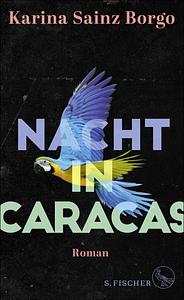You need to sign in or sign up before continuing.
Take a photo of a barcode or cover
dark
emotional
sad
tense
slow-paced
challenging
dark
emotional
sad
tense
fast-paced
Plot or Character Driven:
Character
Strong character development:
Yes
Loveable characters:
Complicated
Diverse cast of characters:
Complicated
Flaws of characters a main focus:
No
This book is truly frightening in that it could be a glimpse of what might happen someday in the United States. I grieve for the people in Venezuela, which was once a beacon of democracy in South America.
challenging
dark
emotional
mysterious
tense
medium-paced
Plot or Character Driven:
A mix
Strong character development:
Complicated
Loveable characters:
No
Diverse cast of characters:
No
Flaws of characters a main focus:
No
i’m not exactly sure how to feel about this book. i was really hooked at the beginning, and it felt like this book kind of fizzled out, but in a way hard to describe.
adelaida was quite an interesting protagonist, and i enjoyed her inner monologue, but it almost felt like she had no personality. yes i was told her past experiences and relationships, but i felt i didn’t know anything about *her*. other than her relationship with the photographer do i feel like i got to know more about adelaida, but yet again, it was through a relationship.
at points this book felt like it had no plot. like i was just there for the ride. everything kept constantly changing which meant the tone was drastically changing, and i almost couldn’t keep up. i will say though this book did keep me on my toes, as i could never guess where the book would take me next.
i was fascinated by the grittier aspects of venezuela in this story. i’m not knowledgeable enough about history to know how much of this was fact or fiction, but i will say the portrayal of adelaida’s world was gripping. a lot of things felt like they weren’t explained properly in terms of context, almost feeling like the audience already knew that information, so at times i felt quite seperate from the story.
this book was very odd with its non-linear structure, as one minute i would be fearing for adelaida’s life and the next i would be in a past memory. this constant fear to relaxation was quite jarring, and although i was a fan of the flashbacks and current day stories separately, together they didn’t click for me. also, at times adelaida’s memories felt compelling, such as her stories with her aunts, but other times to me i couldn’t discern the significance of the memory, and thus i was bored.
by the end, it felt like i was reading an entirely different book to the beginning, with adelaida turning into a narrator who repeats a handful of phrases and feelings. something something meta commentary about her adapting over the course of the book. say it with me - if ur meta commentary bores me, it didn’t work.
anyways, as much as i dunked on this book, i did have a good time ! but i do think the book’s short nature was defo a factor here - if i had to keep reading past the last page i feel my enjoyment of this book would severely plummet.
anyways, thank you karina sainz borgo for taking me to venezuela from my kobo.
Graphic: Cancer, Death, Drug use, Gun violence, Violence, Death of parent, Murder
Moderate: Rape, Torture, Trafficking
Minor: Animal cruelty, Animal death, Dementia, Alcohol
It took me a while to share my thoughts on It Would Be Night in Caracas.
This book is set in Venezuela during its revolution, and along with that, this is an important story because it put Venezuela back in my awareness. I was in college studying Spanish literature when Chavez assumed the presidency. If I hadn’t been in that particular class, I’m not sure I would have known this happened because I’ve heard very little about Venezuela since.
As far as the actual story, I enjoyed its emotional intensity, but it was choppy at times with flashbacks and organization that could be hard to follow. I was also left wanting more as far as other voices and perspectives to get a more clear perspective and understanding.
I’m grateful I read the book because it reminded me that one point of view is only one point of view, especially when it comes to political turmoil and uncertainty.
The great news is this book served as a jumping off point because I want to read more about Venezuela and immediately noticed there are few translated fiction books. I have a TBR list of mostly nonfiction, but if anyone has any fictional works in English to share with me, please let me know.
I received a gifted copy.
This book is set in Venezuela during its revolution, and along with that, this is an important story because it put Venezuela back in my awareness. I was in college studying Spanish literature when Chavez assumed the presidency. If I hadn’t been in that particular class, I’m not sure I would have known this happened because I’ve heard very little about Venezuela since.
As far as the actual story, I enjoyed its emotional intensity, but it was choppy at times with flashbacks and organization that could be hard to follow. I was also left wanting more as far as other voices and perspectives to get a more clear perspective and understanding.
I’m grateful I read the book because it reminded me that one point of view is only one point of view, especially when it comes to political turmoil and uncertainty.
The great news is this book served as a jumping off point because I want to read more about Venezuela and immediately noticed there are few translated fiction books. I have a TBR list of mostly nonfiction, but if anyone has any fictional works in English to share with me, please let me know.
I received a gifted copy.
One of the season’s offerings from HarperCollins’s new imprint, Harper Via, which focuses on fiction in translation. Borgo is a Venezuelan journalist; this is her first novel. She no longer lives in her home country but in Spain, and has been watching Venezuela descend into lawlessness over the past thirteen years. Some of what she has seen is echoed in the experiences of her protagonist, Adelaida Falcon, whose world falls apart immediately after she buries her mother. Adelaida’s flat is commandeered by a group of violent and clearly working-class women – supposed revolutionaries, though their behaviour is more like that of petty warlords – who use it as a base to store the food supplies that they are meant to be distributing equally throughout the district. (They are, of course, selling most of it on the black market at ridiculously inflated prices.) Driven from what remains of her home, Adelaida finds shelter in the flat of her neighbour, who happens to have died of a heart attack. She also offers sanctuary to her friend’s brother, Santiago, who has been captured, tortured and raped, and made to join the revolutionary forces, but deserts the instant he gets the chance. Adelaida’s and Santiago’s silent, nocturnal lives – they cannot draw attention to themselves for fear of being found out by the women in the flat next door – make up the bulk of the book, interspersed with childhood flashbacks, until Adelaida at last takes the risk of attempting to impersonate the dead woman, who has family in Spain, and flee the country.
The briefest trawl of Goodreads throws up lukewarm reviews of It Would Be Night in Caracas. A lot of them are in Spanish, which I don’t read very well. The longest one in English suggests that Borgo has, either out of intentional malice or out of culpable ignorance enabled by her own position of privilege as a white Venezuelan member of the property-owning classes, written bourgeois propaganda meant to dupe the English-reading public into supporting action against a democratically elected Venezuelan government. This was not something I considered while reading the book, and I’m glad to have been made to stop and think about it afterwards. As far as the convincing fictional construction of a life under siege goes, Borgo’s nailed it; the novel feels both dreamlike and hyper-real because those are the conditions of emotional and physical stress under which her characters live, and she pulls that off because she can write. (Her journalistic training may help; there’s a straightforward lack of melodrama to her descriptions of suffering that enhances their power.) I would need to know more than I do about Venezuelan history and politics to be able to say whether this feels more like a cynical maneuver, a sincere cri de coeur from an exile, or something in between. But it sure as hell works on a technical level.
The briefest trawl of Goodreads throws up lukewarm reviews of It Would Be Night in Caracas. A lot of them are in Spanish, which I don’t read very well. The longest one in English suggests that Borgo has, either out of intentional malice or out of culpable ignorance enabled by her own position of privilege as a white Venezuelan member of the property-owning classes, written bourgeois propaganda meant to dupe the English-reading public into supporting action against a democratically elected Venezuelan government. This was not something I considered while reading the book, and I’m glad to have been made to stop and think about it afterwards. As far as the convincing fictional construction of a life under siege goes, Borgo’s nailed it; the novel feels both dreamlike and hyper-real because those are the conditions of emotional and physical stress under which her characters live, and she pulls that off because she can write. (Her journalistic training may help; there’s a straightforward lack of melodrama to her descriptions of suffering that enhances their power.) I would need to know more than I do about Venezuelan history and politics to be able to say whether this feels more like a cynical maneuver, a sincere cri de coeur from an exile, or something in between. But it sure as hell works on a technical level.
dark
sad
tense
medium-paced
dark
emotional
tense
challenging
dark
informative
reflective
sad
medium-paced
Plot or Character Driven:
A mix
Strong character development:
Yes
Loveable characters:
Complicated
Diverse cast of characters:
Complicated
Flaws of characters a main focus:
No






